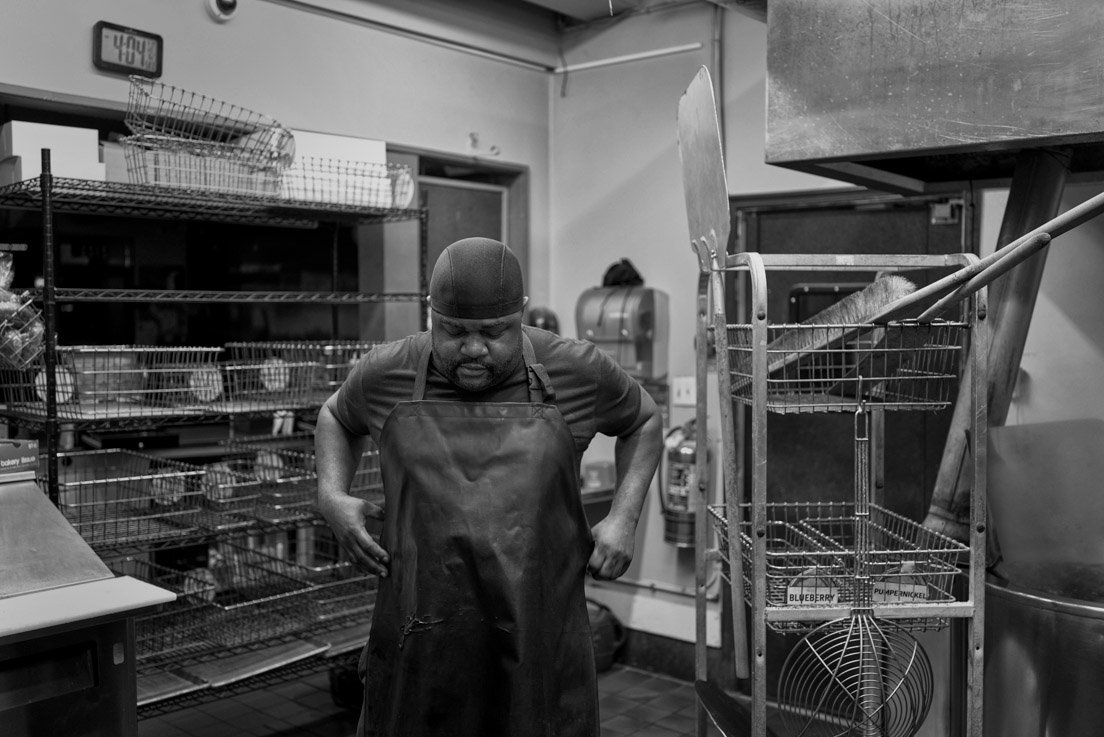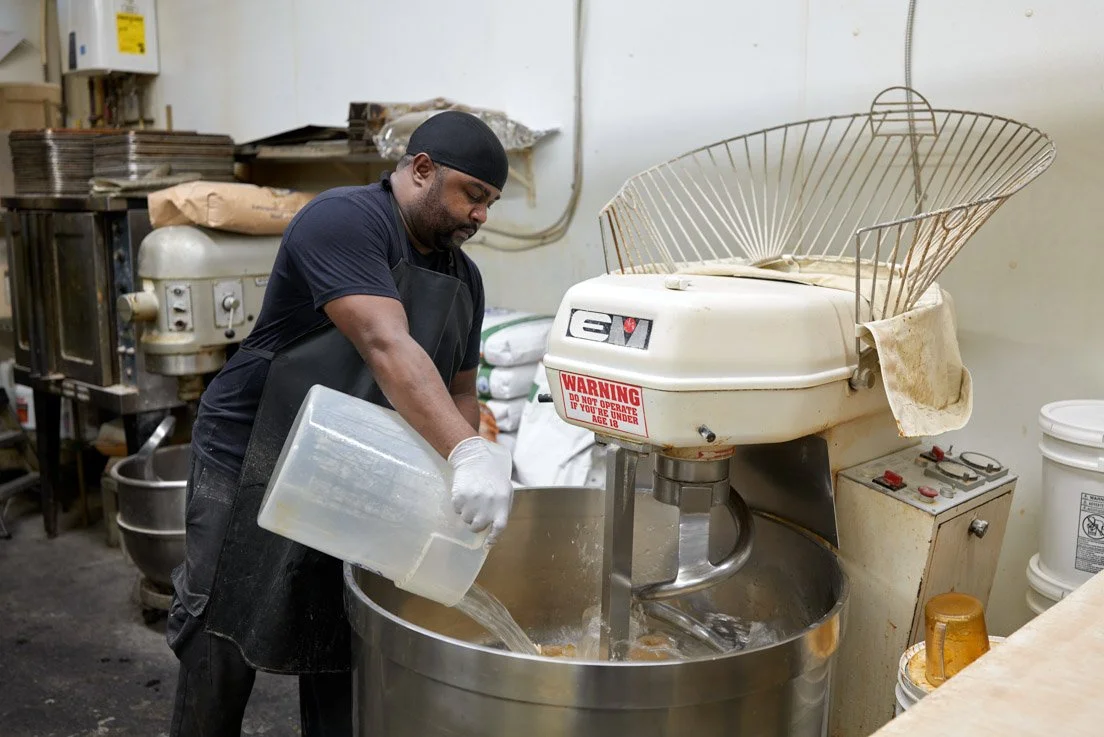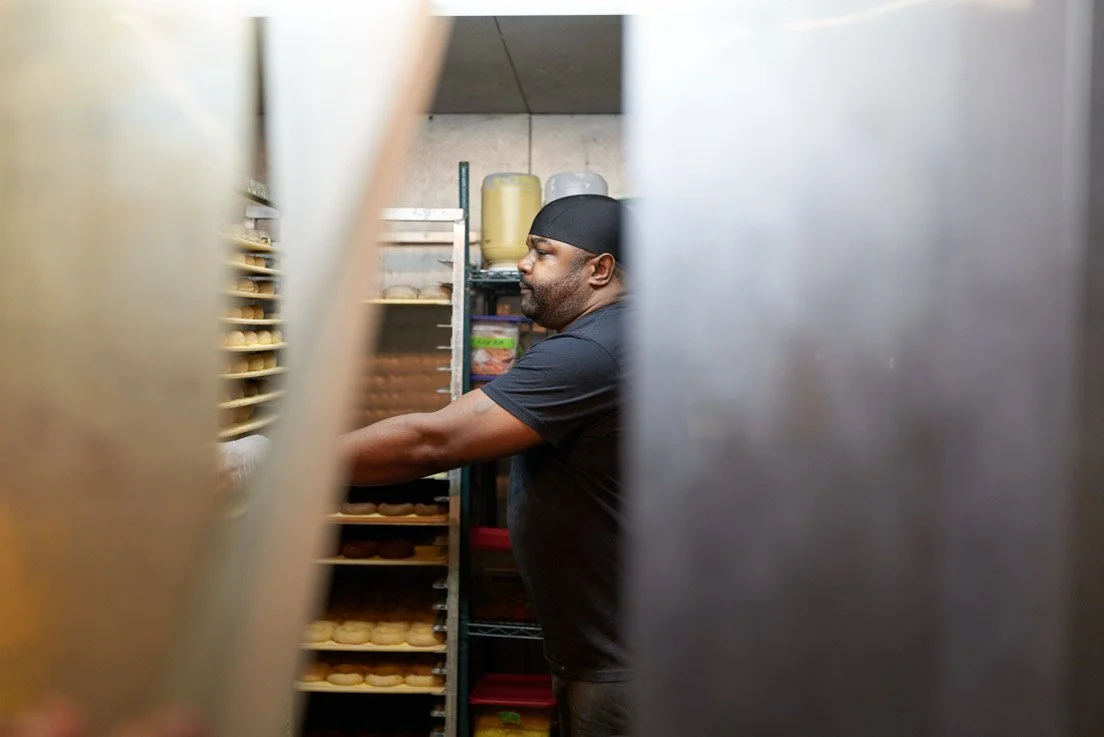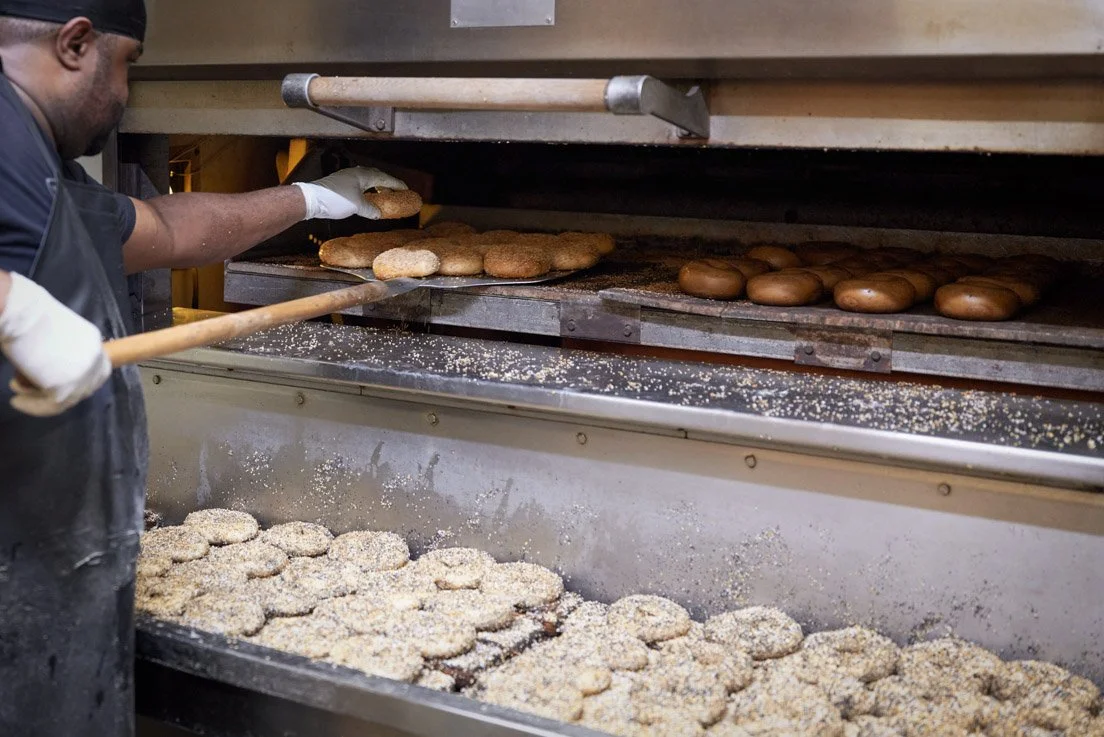After a stint in the Army, jobs in construction, warehouses and landscaping, Norfolk man finds his calling in a bakery
By Philip Shucet
Virginia Center for Investigative Journalism at WHRO
If you stop for a bagel before your morning commute, you’re not alone. Over the course of a year, 200 million Americans are doing the same thing. Any way you slice it, bagels are a billion dollar business.
Ordered as a sandwich or with only a schmear, we expect them to be fresh. And that’s why Zephaniah Cain starts working at 3 a.m. every day. He does it for us. Cain bakes bagels.
Cain was born in Hawaii when his father was stationed there with the Army, and grew up in Portsmouth with his parents and two younger sisters. Cain did his own tour with the Army in the 1990s and worked as a chef. After various jobs, he always came back to cooking. He has been baking at Yorgo’s Bageldashery for the past five years. He’s so much a part of the business, a sandwich is named after him.
Cain, 48, lives in Norfolk and talked to us twice. First, in the pre-dawn hours as he worked in the steamy, hot kitchen of Yorgo’s, and again over a cold soda at the end of his work day around noon.
The interviews have been lightly edited for length and clarity.
When I first get here, I'm basically turning all my ovens on, setting my racks up for my bagels. Getting my list of things to do prepared for the day, as well as setting things up for the restaurant, turning on the flat top grill, turning on all the lights, getting all the engines going so when everybody else gets here everything is ready to go for them.
Right now I'm just waiting for the kettle and the oven to reach a certain temperature. The kettle has to be boiling. And our oven has to be at right around 450 degrees. So we're about 25 degrees off from there.
There are five shelves. We place 50 bagels on each shelf. So at any given time, there'll be 200 - 250 in here. They steadily roll. You get into a rhythm where you'll pull bagels out and put fresh ones in. And once you get into that, you'll just keep rolling and rolling and rolling until you get to the end of your rack. That's how we do it.
It takes about 18 minutes to mix the actual dough, and it takes about 25-30 minutes to get them in the oven and baked. They bloom. They have a certain puffiness to them. They have a shine. And if you grab one and you split it, you’ll hear a certain crunch. That is how you know that you have a very good bagel.
I bake about 500 bagels on a weekday, but on the weekend it gets up there, so it could be 1,000 or more.
We use the freshest ingredients. We do not skimp. Even our water for our bagels is different. We filter our water two, three times more for our bagels. Have a special sink for it and everything. So yeah, it's a big deal.
A bad day would be a leak in a kettle, or let's say the pilot light not wanting to light. A bad day would be over-proofed bagels and having to bake those. Like if the walk-in refrigerator was to somehow shut down, all of the bagels will be over proofed and they will be very hard to bake.
But mostly, as long as the equipment is good, we're good. This morning it's going to be a great day. Everything's on, everything's running smoothly. I've got everything set up. I'm a few minutes ahead of myself. So yeah, a great day is when you can turn everything on and everything comes on.
You can't go out of order. (The bagels) you put in first, you take out first. What you put in second, you take out second. It is so important to pay attention to your order, because if one shelf is out of place, the complete bake is in jeopardy and you can end up burning the entire oven of bagels.
It gets very warm. It's great in the wintertime. Summertime, however, if you have a diet plan, this is the place to be, because you will lose weight. Sweat it off. You have a 400 degree oven and 350 degree steaming water in front of you. So it’s a great workout without having to work out.
Where do I start? Making good dough is vital. I'll take yesterday's dough — that’s called the ‘mix backs.’ We use the mix backs because it adds depth to the dough. We get a certain amount of water, pour it in and allow the water to incorporate with the mix backs. Then I'll add fresh flour to that. It’s about an 18-20 minute process.
I take the dough out and cut it. Then we'll run it through the machine to form the bagels and stack them up on the racks. Our yeast, brown sugar, salt and malt… we add all of those first to allow all of that to blend together, and then we'll add the fresh flour on top of that.
Our bagels are basically five ingredients: malt, salt, sugar, water and yeast. That's basically every bagel we make now. Obviously we'll add, you know, cinnamon and raisins or jalapeno, we'll add jalapenos. But the basis of every bagel we make are five ingredients and five only. That's how we roll.
You really have to pay attention to how much water you're putting in here. This is a hundred pounds of dough. We start out with 24 quarts of water, but that's usually not enough. I’ll keep testing the dough and add a little bit of water here, a little bit of water there, but you never want to add too much. You can always add water, but once you put it in there, you can't take it out.
In the beginning (going to work at 3 a.m.) was a little rough. It took some getting used to, but now it’s second nature. It's just in me to do that now. Even on my days off, I get up early, 2:30-3 a.m. And I've been doing that now for about five years. It's like breathing. To come in at 3 and be out at 11 a.m., it's a good time.
I mean, I've done other things, tried other things, but I always found my way back to the kitchen. I tried construction, land development. I've tried roofing. I've tried landscaping. What else? I worked in all types of warehouses from drywall to packing companies. I've been around a little bit, but I've always found my way back to the restaurant and to the kitchen. So once I got back here (in Norfolk), I decided this is it. I'm not going to go and try anything else.
Just about everybody who knows me knows I'm pretty good in the kitchen. Most people know that they can call me in an emergency and need something prepared. So not just my family, my friends, close friends, people in general, they know my work and that I enjoy what I do.
The foundation of (my work ethic) comes from my mother. She had me in the kitchen when I was around 8 or 10 years old. And from there I just kind of fell in love with it. From a very young age she always taught me to cook with love, and cook with honesty, and to cook with passion and people will enjoy what you cook. She taught me you don’t just come in here and cook. You come in here and you cook to satisfy people.
Anybody could go into a kitchen and throw some things together and put it on a plate, but people can tell that there’s love and passion into what they're eating…and when there’s not.
They line up early. We open at 6 a.m. and a lot of days there’ll be 5, 10, 15 people lined up. I think one of the reasons we’re so popular is because people know they’re getting - from scratch, fresh out of the oven - bagels. They know there’s someone in there early who’s going to put out a good product for them, and they appreciate that.
Working Virginia is a monthly series for VCIJ by Philip Shucet. You can reach him at: philip.shucet@philipshucetphotography.com. Words and pictures ©️Philip A Shucet.




